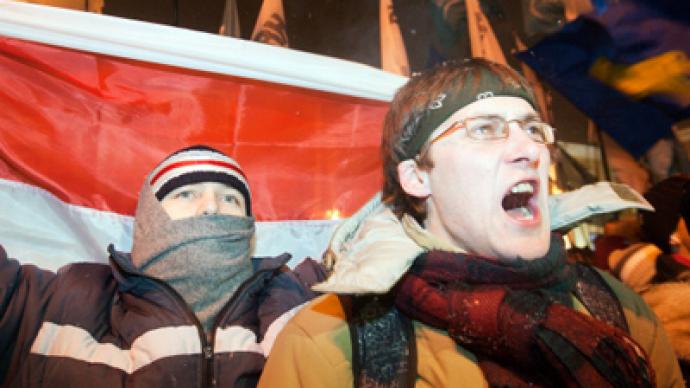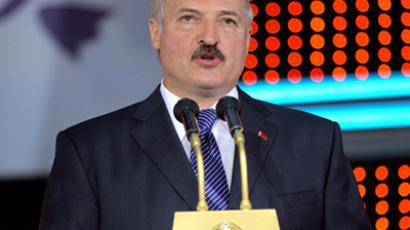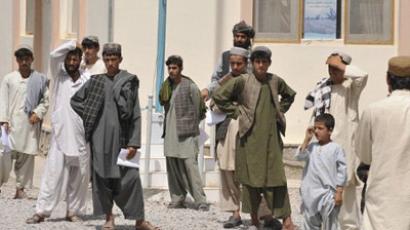Belarus seeks protection against coups

Belarus' President Aleksandr Lukashenko has stated that the Collective Security Treaty Organization (CSTO) member-states are considering the possibility of using rapid reaction forces to prevent coups.
According to the veteran Belarusian leader, this idea, as well as the deployment of foreign military bases on the territory of CSTO countries, has already been agreed with Moscow. “The matter is not only the use of the Collective Rapid Reaction Forces (CRRF) in the event of interference of states outside [the CSTO], but also interference by other states within the organization. It will be a serious support for the CSTO members, because no one will unleash a war on us, but many are itching to commit a constitutional coup,” Lukashenko said at a meeting with CSTO Secretary General Nikolay Bordyuzha in Minsk on Tuesday, Interfax reports.“We should protect the integrity and independence of the CSTO countries,” the president added. Lukashenko pointed out that during his recent meeting with Russia’s President Dmitry Medvedev in Sochi, they discussed issues that were touched upon at the informal CSTO summit in the Kazakh capital of Astana.According to the Belarusian head of state, Moscow supported Minsk’s initiative to "finish manning and equipping CORF as soon as possible, if we want to have a truly integral organization."He underlined that the two countries "see totally eye-to-eye on all of the issues linked to the CSTO."The idea of strengthening the CRRF and deploying its bases on the territories of the CSTO does have its opponents though, reports the Nezavisimaya Gazeta (NG). During the last summit in December last year, Uzbek leader Islam Karimov refused to sign documents that legitimized the deployment. Under current CSTO legislation, all decisions are made by consensus, which means that, officially, the formation of the CRRF was and continues to be illegal, the paper notes.It was in that regard, according to Lukashenko, that he and Medvedev spoke about Uzbekistan’s membership of the organization. "We and the Russian Federation agreed to join efforts to preserve the organization,” he said. “If anyone does not want to work or fulfill the functions outlined by the charter, one should quit the organization and should not stand in the way of others."Meanwhile, the on-line newspaper, gazeta.ru, observes that even the CSTO is not sure yet how exactly it could use its joint troops to prevent coups. The body’s press service refused to comment on the matter, but a source close to the organization told the news website that the organization is not ready for such actions. The source recalled last year’s unrest in Kyrgyzstan, when no decision on sending peacekeepers to the conflict-torn country was made, even though it would have been considered reasonable to do so. At the same time, the source pointed out, a scenario similar to the current conflicts in the Arab world is possible not only in Belarus, but also in Uzbekistan and Tajikistan. Minsk’s fears are quite predictable following a series of opposition protests that took place in the wake of the Belarusian presidential election at the end of December last year. The vote brought a landslide victory to Lukashenko and secured him a fourth term in office. The opposition claimed the election results were falsified and demanded a new vote, but without Lukashenko’s participation. The protest was violently suppressed by police and about 700 people, including former presidential candidates, were arrested.According to Russian MP Tatyana Moskaltsova, Lukashenko’s proposals contradict the CRRF charter and tasks. “The Belarusian president’s inconsistency never fails to amaze me. Last year, he refused to chair the CSTO and received in his state [ousted Kyrgyz President] Kurmanbek Bakiyev”, she told gazeta.ru. In addition, Moskaltsova went on, despite what is widely recognized as Georgian aggression against South Ossetia in 2008, Lukashenko invited Georgian President Mikhail Saakashvili to Minsk.The CSTO, which is also referred to as the “NATO of the East”, is made up of seven former Soviet republics: Russia, Armenia, Belarus, Kazakhstan, Kyrgyzstan, Tajikistan and Uzbekistan.The military alliance was created on May 15, 1992 in order to provide security in the post-USSR space and to prevent international terrorism and extremism. Azerbaijan and Georgia withdrew from the organization back in 1999. Tbilisi is now actively seeking NATO membership.














